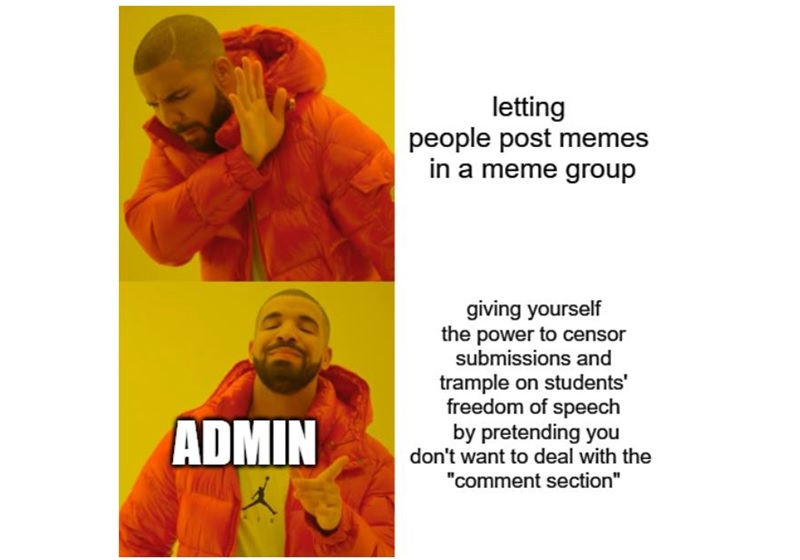The internet is so ingrained in our daily lives that we often take it for granted. But when the pandemic forced most students off campus last semester, and our campus got converted to cyberspace, the internet allowed a now-worldwide University community to remain close. Zoom became the new classroom, but social media conquered social interaction and public discourse. Internet culture became University culture.
Of course, even before the pandemic, Facebook was a key platform for UR students public discourse. The oldest UR pages have been around for over a decade.
“Overheard at Rochester” began as a group to post funny things students hear others saying on campus, but evolved into a space where opinions about campus current events are posted more than anything else. “Ever better memes for meliora teens” is a group built for sharing UR-specific memes. Both have been around since before current seniors began their college experience. The sentiments behind these groups aren’t unique to the University — most colleges have their own meme group and “Overheard” group. And like most schools, our pages have seen an uptick in activity during the pandemic.
Other, more targeted groups have sprung up more recently. “UofR Quarantine” was founded just a few weeks ago for students quarantining upon return to New York state. A group devoted to International Students began just after the University switched to remote classes in March.
These newer groups grew out of what felt like necessity to some amid the new online environment. Once junior Lea Thome noticed there wasn’t a group specifically for international students, “I realized that such a platform should definitely exist and created it,” she said.
Most of the posts in “International Students – University of Rochester” are from people who need help navigating travel restrictions, University policies and deadlines, and health guidelines. “Almost every time, there is someone who has an answer, can help, or has experienced the same [thing],” Thome said.
The more popular, long-standing groups are often uplifting, too. Many posts on “Overheard” depict sightings of groundhogs or the infamous Quad Fox. Other posts share new announcements from administrators or inform students of upcoming events and opportunities. On “Ever Better Memes,” people find others experiencing the same frustrations as them, and laugh about it together.
But sometimes, discourse about important issues on campus sparks long, heated discussions in the comments of these groups. Last year, events relating to China’s mistreatment of Tibet and the Uyghurs sparked productive conversation about human rights abuses, but also resulted in hateful memes. Discussion of controversial issues in these groups sometimes causes students to file bias-related incident reports.
That’s where moderators come in.
Each moderator interprets their role differently, but generally they volunteer their time to ensure the quality of a group. That means making decisions about what types of posts to restrict and which people to allow in the group in order to ensure the page remains welcoming, streamlined, and focused on the reason it was created. As the social dependence on these groups has grown with the pandemic, so too has the importance of these student moderators.
“The biggest decision that the other admins and I have had to make is to require members to submit their posts for our approval,” senior Ash Figueira, moderator of “Ever Better Memes,” said. “It was met with a lot of cries about ‘censorship’ and ‘free speech,’ at which point we had to explain to a bunch of college students what their right to free speech actually means.”
He added that the moderators’ personal beliefs guide decisions about the group, and that people who disagree can create their own meme page.
Moderating is sometimes difficult or stressful. Figueira described a time the Burgett Intercultural Center contacted him about a bias-related incident report. A discussion on “Ever Better Memes” about white privilege sparked accusations towards Figueira of bias against white cisgender men.
“It got to a point where I deleted the Facebook app from my phone because I was constantly checking the comments of controversial posts,” he said.
“Sometimes it gets challenging and overwhelming, especially when there’s a lot going on and a lot of things are happening on campus,” senior Zina Miqdadi, a moderator for “Overheard at Rochester,” said. “However, at the end of the day, it’s very rewarding to be involved in and in charge of a group that has a sizable impact on the [UR] community.” One example of an impactful decision Miqdadi made last year was to publish an anonymous statement by a student who helped paint the tunnel with pro-Hong Kong messages.
Though the moderators sometimes have to make difficult decisions to remove a troll from the group or determine what qualifies as a racist post, the widespread usage of these groups indicate that people feel welcome to share their views on anything from global human rights abuses to Mel Sauce.
Facebook began at a college as a way for students to connect with others on their campus. UR has occupied online spaces for decades, but last semester, students leaned into these communities looking to completely replace large-scale in-person social lives. Now, many students are returning to campus, though the pandemic continues. The balance between in-person and online discourse remains to be seen.


